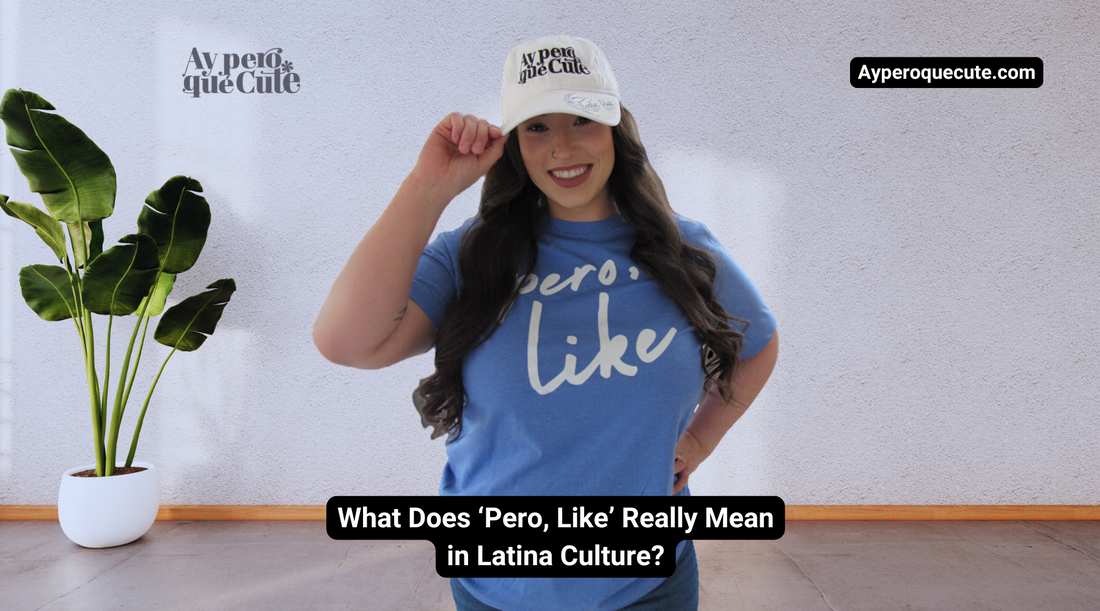
What Does ‘Pero, Like’ Really Mean in Latina Culture?
Share
The phrase “pero, like” has become more than a casual quip; it's a cultural marker, a linguistic blend, and a stylish statement all in one. In many bilingual households, especially among U.S. Latinas, “pero, like” is as common as cafecito at abuela’s house. It flows naturally in conversations where English and Spanish aren’t just languages but lived experiences that coexist.
At its surface, the phrase might seem like simple Spanglish, a mix of “but” in Spanish and “like” in English. But its true meaning runs deeper. “Pero, like” is a reflection of bicultural identity. It’s how many Latinas pause, reflect, add emphasis, or inject humor and realness into their conversations. It’s emotional. It’s expressive. And it’s unmistakably ours.
What started as everyday speech has now made its way into pop culture, social media, and even fashion. Whether it’s used in viral TikToks, podcast chats, or printed boldly across tees and sweatshirts, “pero, like” is everywhere, and for good reason. It captures a shared experience that’s hard to explain but easy to feel.
In this post, we’ll break down what “pero, like” really means, from its literal translation to its cultural power, and why it continues to resonate so strongly within the Latina community today.
Ready to wear your words? Explore our ‘Pero, Like’ and rep your cultura with pride.
Literal Meaning vs. Cultural Use
At first glance, “pero, like” may seem like a simple combination of two common words. Here's what they mean on their own:
-
Pero = “But” (Spanish)
-
Like = A casual filler (English), often used in spoken language to pause, soften, or emphasize
When combined, “pero, like” becomes a bilingual bridge, a phrase that naturally flows in conversations among people who think, speak, and live in two languages. It acts as a transition or intro to a statement, usually said with a tone of sass, curiosity, or frustration. More than grammar, it's about tone and attitude.
You’ll hear it used to:
-
Express hesitation or contradiction
-
Add personality or humor to a statement
-
Ease into a thought or opinion
-
Build up to something emotional, dramatic, or honest
“Pero, like, who does that?”
“Pero, like, I was just saying…”
“Pero, like, no me juzgues.”
These aren’t just mixed words, they’re pieces of cultural rhythm, passed on from one conversation to the next. It’s not just what we say, it’s how we say it.
Real-Life Examples of 'Pero, Like' in Conversation
-
“Pero, like, who told you that was cute?”
-
“Pero, like, I’m not even mad, just confused.”
-
“Pero, like, I’m gonna be late... again.”
-
“Pero, like, it’s not my fault!”
-
“Pero, like, are you serious right now?”
-
“Pero, like, I had to say something.”
-
“Pero, like, you already know how I feel.”
These everyday phrases show just how naturally “pero, like” fits into real-life speech, especially for those who navigate life in two languages and want to bring emotion, honesty, or humor into what they say.
The Spanglish Effect: Why We Mix Languages
Spanglish isn’t a mistake. It’s not broken English or incorrect Spanish, it’s a valid and powerful form of communication for millions of people, especially in bilingual Latino communities. For Latinas who grow up navigating both languages at home, school, and work, switching between English and Spanish happens naturally.
Cities like Miami, Los Angeles, and New York are rich in linguistic diversity, and this kind of language blending isn’t just common; it’s cultural. Words like “pero, like” reflect that fluidity. They capture moments, moods, and meaning in ways that don’t always translate perfectly into one language alone. Spanglish gives space for identity, comfort, and expression. It’s how we stay true to both sides of who we are.
Pero, Like’ as a Fashion Statement
Wearing “pero, like” on a t-shirt isn’t just a trend, it’s a statement. Latina-owned brands like Ay Pero Qué Cute are creating space for cultural expression by turning familiar phrases into bold, wearable pieces. These designs aren’t just cute — they mean something.
-
Celebrates bilingual culture
These tees are more than fabric, they’re reflections of how Latinas live and communicate daily. Spanglish phrases like “pero, like” represent a natural, authentic way of speaking that doesn’t separate languages but blends them beautifully. Wearing them openly honors a heritage that’s often misunderstood or overlooked in mainstream spaces. -
Sparks conversations
Statement pieces invite curiosity. When someone sees “pero, like” on your shirt, they’re likely to ask what it means or where it comes from. That moment becomes an opportunity to share part of your culture and your voice. It turns everyday fashion into a connection point between people from different backgrounds. -
Empowers wearers through familiarity
There’s something deeply validating about seeing your lived experience reflected in what you wear. It’s not just stylish; it feels like home. For many Latinas, these phrases were first heard from family or friends, making the tee feel like a hug from your culture, personal, warm, and real. -
Makes cultural pride stylish
Pride doesn’t have to be loud to be powerful. A simple phrase printed on a clean, modern design speaks volumes. It allows Latinas to celebrate where they come from without compromising style. These pieces fit right into contemporary fashion while carrying a message that’s timeless.
Influencers and Pop Culture Usage
The phrase “pero, like” has made its way from everyday speech into mainstream pop culture, especially through the voices of Latina creators on platforms like TikTok and Instagram. From viral skits to meme captions and relatable reels, content creators have embraced the phrase as a way to express emotion, humor, or frustration with a cultural twist.
Its casual, sassy tone fits perfectly into the rhythm of digital storytelling, making it instantly recognizable and easy to connect with, even for those who don’t speak Spanish. As a result, “pero, like” has become not just a phrase but a trend, helping bridge cultures and bringing Spanglish into the spotlight.
What This Phrase Really Represents
-
Confidence without apology
“Pero, like” isn’t just a filler; it’s a phrase packed with personality. When someone uses it, they’re asserting themselves in a way that’s direct but relatable. It reflects a kind of self-assurance that says, “I’m going to speak my truth, but in my own way.” -
Cultural connection
This phrase connects generations of bilingual speakers. Whether you grew up hearing it from your primas or saying it in daily conversation, it becomes a shared thread between people who understand its rhythm and roots. It carries the familiarity of home and community. -
The voice of a generation
Today’s young Latinas are using language to express who they are, and “pero, like” has become part of that voice. It represents the bilingual, bicultural experience in a way that feels modern, real, and relevant. It’s part of how we speak and how we shape culture. -
Humor and authenticity
Sometimes, “pero, like” is used to say something serious, but often, it’s just fun. It softens a conversation, adds wit, or sets the tone for something hilarious. It's honest and casual, helping people speak freely while keeping it light and full of flavor. -
A bilingual mindset in action
This phrase is a great example of how people switch between English and Spanish naturally. It shows how both languages live side-by-side in thought and speech, without rules or formality. It’s not about translation, it’s about expression.
Conclusion: A Phrase That’s Here to Stay
“Pero, like” is more than just a phrase; it’s an expression of identity, culture, and comfort. It speaks for those who live in two languages and two worlds but still find one voice to express it all. It’s casual, confident, and completely ours.
Whether you’re saying it, posting it, or wearing it proudly, “pero, like” is here to stay because it belongs to us.
Ready to wear your voice?
Check out our Pero, Like tee and other Spanglish-inspired styles that let you celebrate your culture your way.
